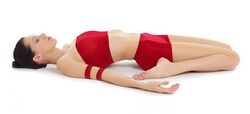Unsolved:Supta Virasana
Supta Virasana (Sanskrit: सुप्तवीरासन; IAST: Script error: The function "transl" does not exist.) or Reclined Hero Pose is an asana.[1]
Etymology
The name comes from the Sanskrit words supta (सुप्त) meaning "reclined",[2] and asana (आसन; āsana) meaning "posture" or "seat".[3]
Description
Supta Virasana is a reclined version of virasana where the upper body reclines backwards, so that the back rests on the floor. The arms rest on the floor to either side of the trunk, with the palms facing up.
Anatomical focus
Lengthens the extensor muscles of the leg and the deep psoas muscles that connect the legs to the trunk.[4][5]
Contraindications and cautions
With knee conditions and during menstruation with excessive bleeding it may be contraindicated to practice Supta Virasana.[6][7]
Variations
Eka Pada Supta Virasana (One-Legged Reclining Hero Pose) or Ardha Supta Virasana (Half Reclined Hero Pose[6]) involves one leg folded under the body while the other is being stretched.[8]
See also
- Vīrāsana
- List of asanas
References
- ↑ "Witold Fitz-Simon - Supta Virasana". http://www.yogaartandscience.com/poses/restpos/suptavira/suptavira.html. Retrieved 2011-07-09.
- ↑ "Yoga Journal - Reclining Hero Pose". http://www.yogajournal.com/poses/790. Retrieved 2011-07-09.
- ↑ Sinha, S.C. (1 June 1996). Dictionary of Philosophy. Anmol Publications PVT. LTD.. p. 18. ISBN 978-81-7041-293-9. https://books.google.com/books?id=-zzRvh1fRzEC&pg=PA18. Retrieved 9 April 2011.
- ↑ Couch, Jean (10 June 1990). The Runner's Yoga Book: A Balanced Approach to Fitness. Rodmell Press. p. 65. ISBN 978-0-9627138-1-1. https://books.google.com/books?id=adMQDWj3XMcC&pg=PA65. Retrieved 9 July 2011.
- ↑ Yoga Journal. Active Interest Media, Inc.. 1994-09-01. p. 58. https://books.google.com/books?id=VekDAAAAMBAJ&pg=PA58. Retrieved 2011-07-09.
- ↑ 6.0 6.1 Kappmeier, Kathy Lee; Ambrosini, Diane M. (2006). Instructing hatha yoga. Human Kinetics. p. 250. ISBN 978-0-7360-5209-2. https://books.google.com/books?id=K5WaYzBYypkC&pg=PA250. Retrieved 9 July 2011.
- ↑ Clennell, Bobby; Iyengar, Geeta S. (25 April 2007). The Woman's Yoga Book: Asana and Pranayama for All Phases of the Menstrual Cycle. Rodmell Press. p. 105. ISBN 978-1-930485-18-1. https://books.google.com/books?id=5NGg4aCXkCMC&pg=PA105. Retrieved 9 July 2011.
- ↑ Yoga Journal. Active Interest Media, Inc.. May 1989. p. 99. https://books.google.com/books?id=vOsDAAAAMBAJ&pg=PA99. Retrieved July 9, 2011.
Further reading
- Iyengar, B. K. S. (1 October 2005). Illustrated Light On Yoga. HarperCollins. ISBN 978-81-7223-606-9. https://books.google.com/books?id=pbx5AAAACAAJ. Retrieved 9 April 2011.
- Saraswati, Swami Janakananda (1 February 1992). Yoga, Tantra and Meditation in Daily Life. Weiser Books. ISBN 978-0-87728-768-1. https://books.google.com/books?id=FVLqCyTMFikC. Retrieved 11 April 2011.
- Saraswati, Swami Satyananda (1 August 2003). Asana Pranayama Mudra Bandha. Nesma Books India. ISBN 978-81-86336-14-4. https://books.google.com/books?id=YpR1QgAACAAJ. Retrieved 9 April 2011.
- Saraswati, Swami Satyananda (January 2004). A Systematic Course in the Ancient Tantric Techniques of Yoga and Kriya. Nesma Books India. ISBN 978-81-85787-08-4. https://books.google.com/books?id=eWOrAAAACAAJ. Retrieved 9 April 2011.
External links



